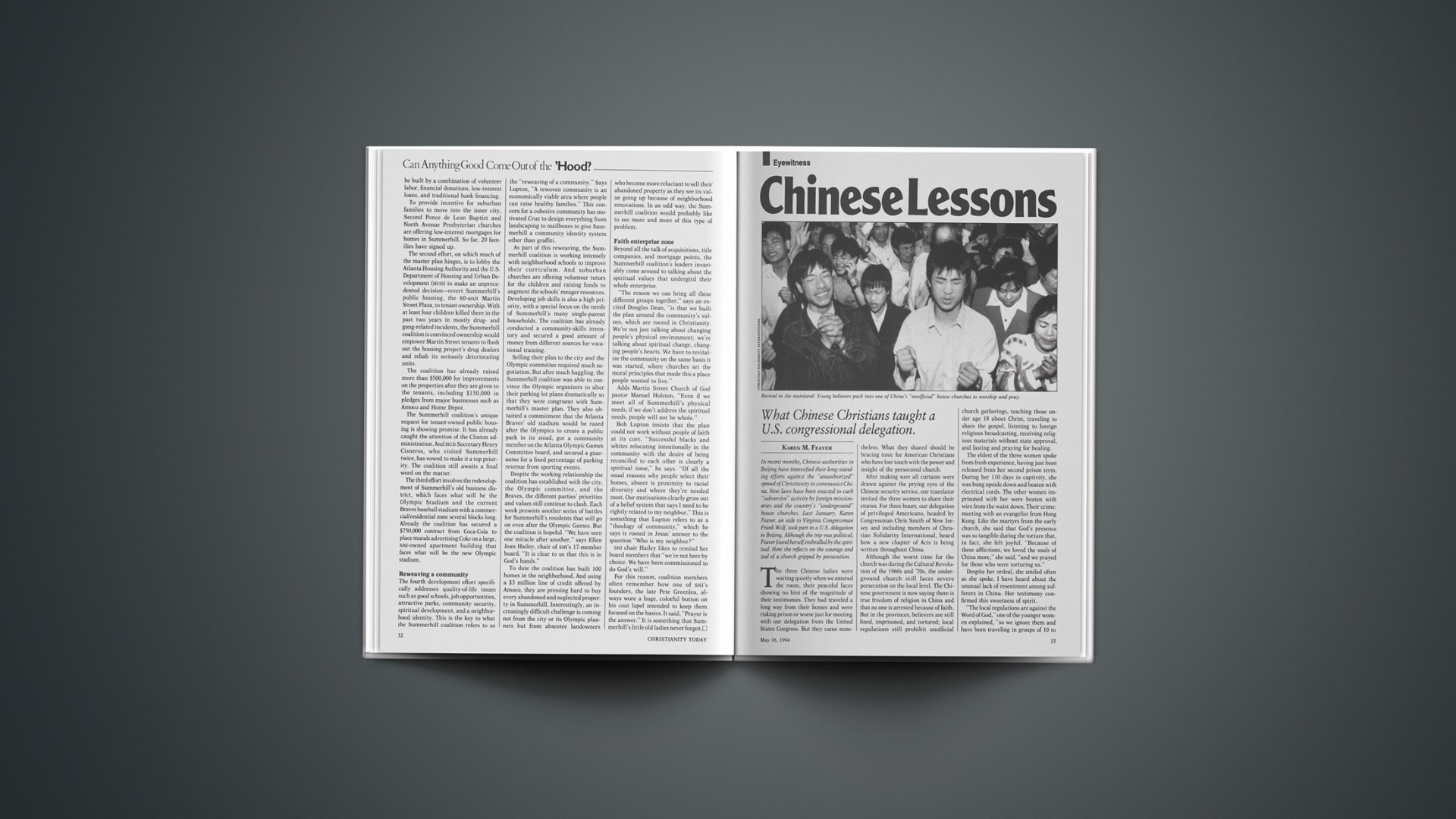What Chinese Christians taught a U.S. congressional delegation.
In recent months, Chinese authorities in Beijing have intensified their long-standing efforts against the “unauthorized” spread of Christianity in communist China. New laws have been enacted to curb “subversive” activity by foreign missionaries and the country’s “underground” house churches. Last January, Karen Feaver, an aide to Virginia Congressman Frank Wolf, took part in a U.S. delegation to Beijing. Although the trip was political, Feaver found herself enthralled by the spiritual. Here she reflects on the courage and zeal of a church gripped by persecution.
The three Chinese ladies were waiting quietly when we entered the room, their peaceful faces showing no hint of the magnitude of their testimonies. They had traveled a long way from their homes and were risking prison or worse just for meeting with our delegation from the United States Congress. But they came nonetheless. What they shared should be bracing tonic for American Christians who have lost touch with the power and insight of the persecuted church.
After making sure all curtains were drawn against the prying eyes of the Chinese security service, our translator invited the three women to share their stories. For three hours, our delegation of privileged Americans, headed by Congressman Chris Smith of New Jersey and including members of Christian Solidarity International, heard how a new chapter of Acts is being written throughout China.
Although the worst time for the church was during the Cultural Revolution of the 1960s and ’70s, the underground church still faces severe persecution on the local level. The Chinese government is now saying there is true freedom of religion in China and that no one is arrested because of faith. But in the provinces, believers are still fined, imprisoned, and tortured; local regulations still prohibit unofficial church gatherings, teaching those under age 18 about Christ, traveling to share the gospel, listening to foreign religious broadcasting, receiving religious materials without state approval, and fasting and praying for healing.
The eldest of the three women spoke from fresh experience, having just been released from her second prison term. During her 110 days in captivity, she was hung upside down and beaten with electrical cords. The other women imprisoned with her were beaten with wire from the waist down. Their crime: meeting with an evangelist from Hong Kong. Like the martyrs from the early church, she said that God’s presence was so tangible during the torture that, in fact, she felt joyful. “Because of these afflictions, we loved the souls of China more,” she said, “and we prayed for those who were torturing us.”
Despite her ordeal, she smiled often as she spoke. I have heard about the unusual lack of resentment among sufferers in China. Her testimony confirmed this sweetness of spirit.
“The local regulations are against the Word of God,” one of the younger women explained, “so we ignore them and have been traveling in groups of 10 to 20 to share the gospel since the early 1980s. The only way the church can survive is through evangelism.” Congressmen do not normally take notes for themselves, but Chris Smith picked up his pen to record personally their daily battle cry: “We go out ready to preach the gospel, ready to go to jail, and ready to die for Jesus’ sake.”
“Wherever we go, signs and wonders follow our sisters and brothers,” the ladies said. During their outreach trip to Sichuan Province, they claimed to have seen many miracles: the blind seeing, the deaf hearing. They told how during a meeting in which no one wanted to believe, someone lame for 70 years got up and walked.
Two stories stick out for me. The women told of a Saullike public security officer who was intent on finding and persecuting the underground believers. Last year his believing wife became so ill that she could neither talk nor walk. The family spent 80,000 yuan (about $10,000 dollars) searching for a cure. The local believers decided to show the officer forgiveness and went to pray for his wife. She was miraculously healed, and her husband gave his life to the Lord. He said to them, “Now I know you Christians are really good people. Before I always persecuted Christians, but now I will tell you if the government wants to harm you.”
“God used his miracles to protect us,” one of the women added softly.
Another testimony revolved around a brother sharing the simple message of repentance and faith with a crowd hearing the gospel for the first time. A vision of Jesus walking among them and then suffering on the cross appeared to all gathered. When the teacher told of Jesus rising from the dead, the vision showed Jesus ascending “to heaven gloriously.” Through that vision, many people surrendered their lives to the Lord.
The only prayer requests the women expressed were for Bibles and freedom. The need for Bibles for new converts is boundless because of the amazing growth of the Chinese church. They said smuggled Bibles continue to be necessary since government regulations hinder Bible distribution to underground believers.
The church in China contains between 30 and 80 million believers, and it is growing fast. One house-church leader described the great spiritual hunger among the young that followed Tiananmen Square. A young Christian businessman told us of leading 70 percent of his workers to Christ in a matter of months. The women spoke of 40,000 coming to Christ during one recent month of “gospel sharing.”
They also asked that we pray for freedom so they could travel openly to preach the gospel throughout China, in America, and then “all the way back to Jerusalem to finish the task.”
The revival going on in China could well be the greatest in the history of the church, according to sinologist and journalist David Aikman of Time magazine, and it has much to teach us here in America. While I still wrestle with all the lessons the Chinese church can teach us, I found these differences to be especially instructive:
First, I believe there is a word of caution for us in the apolitical nature of China’s underground church. They fervently pray for their leaders but maintain a careful independence. We are privileged to live in a participatory democracy, but having worked in American politics for almost a decade, I have seen more than a few believers trade in their Christian birthright for a mess of earthly pottage. We must continually ask ourselves: Is our first aim to change our government or to see lives in and out of government changed for Christ?
The second difference is the Chinese church’s focus on the centrality of the gospel and on obeying the Great Commission. As I heard those sisters share, I could not help but think of our endless debates on peripheral issues, such as the validity of charismatic gifts, women’s roles in the church, and so on. To these three women, the reality of God’s miraculous power was the only explanation for the survival and growth of the church in China. And telling of God’s wonders was certainly not limited by gender.
The third difference is the most convicting—at least for me. When the three women had left, I asked our translator whether they needed any financial help. She looked at me thoughtfully and said, “Oh, they do … and they don’t.” I knew what she meant. Even the American church, the wealthiest church in the world, always seems to find itself low on cash; yet the Chinese church is too busy fulfilling the Great Commission to notice their poverty.
We would do well to consider the contrasting judgments of the church in Revelation 3 and 7. They have been ringing in my heart since my return, and they speak volumes about our Christianity today and the purity I saw in the Chinese church.
To the Laodiceans, God says, “I know your deeds, that you are neither cold nor hot.… So, because you are lukewarm—neither hot nor cold—I am about to spit you out of my mouth. You say, ‘I am rich; I have acquired wealth and do not need a thing.’ But you do not realize that you are wretched, pitiful, poor, blind and naked. I counsel you to buy from me gold refined in the fire, so you can become rich, and white clothes to wear, so you can cover your shameful nakedness” (3:15–18, NIV).
Regarding the apostle’s vision of those arrayed in white, worshiping before the throne of God, he is told: “These are they who have come out of the great tribulation; they have washed their robes and made them white in the blood of the Lamb. Therefore, ‘they are before the throne of God and serve him day and night in his temple; and he who sits on the throne will spread his tent over them. Never again will they hunger; never again will they thirst.… For the Lamb at the center of the throne will be their shepherd.… And God will wipe away every tear from their eyes’ ” (7:14–17, NIV).
I have sat at the feet of believers in China who are being fitted even now for those white robes that will adorn the saints. Compared to their finery, I felt spiritually naked.
Paul Brand is a world-renowned hand surgeon and leprosy specialist. Now in semiretirement, he serves as clinical professor emeritus, Department of Orthopedics, at the University of Washington and consults for the World Health Organization. His years of pioneering work among leprosy patients earned him many awards and honors.










